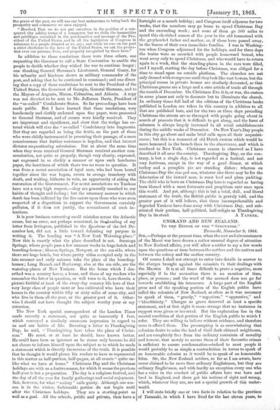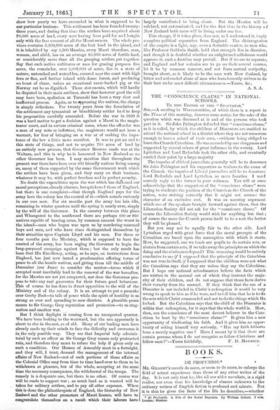ENGLAND AND NEW ZEALAND. To THE EDITOR OP THE "SPECTATOR."
Taranaki, November 9, 1864.
Sin,—Perhaps at the present time, when the cost and circumstances of the Maori war have drawn a rather unusual degree of attention to New Zealand affairs, you will allow a settler to say a few words upon the questions at issue between the settlers and the natives and between the colony and the mother country.
Of course I shall not attempt to enter into details in answer to the charges brought against the colonists their dealings with
the Maories. It is at all times difficult to prove a negative, more especially if in the accusation there is no mention of time, place, or persons ; and the word of the accused does not go far towards establishing his innocence. A large part of the English press and of the speaking portion of the English public have called the colonists of New Zealand, as often as it was necessary to speak of them, "greedy," "rapacious," "oppressive," and "bloodthirsty." Charges so grave deserved at least a specific statement, and at first sight it seems strange that no instances in support were given or invented. But the explanation lies in the mental condition of that portion of the English public to which refer. They are willing to believe without evidence, and therefore none is offered them. The presumption is so overwhelming that colonists desire to seize the land of their dark-skinned neighbours, and are completely free from the ordinary restraints of morality and honour, that merely to accuse them of their favourite crimes is sufficient to ensure condemnation—indeed to most people it would probably be as simple a contradiction in terms to speak of an honourable colonist as it would be to speak of an honourable felon. Sir, the New Zealand settlers, so far as I am aware, have never claimed to be more than ordinary Englishmen, but they are ordinary Englishmen, and with hardly an exception every one who has a voice in the conduct of public affairs here was born and bred in England, and there got his notions of right and wrong, which, whatever they are, are not a special growth of this under- world.
I will state briefly one or two facts iii relation to-the province of Taranaki, in which I have lived for the last eleven years, to show how poorly we have succeeded in what is supposed to be our particular business. This settlement has been founded twenty- three years, and during that time the settlers have acquired about 70,000 acres of land, every acre having been paid for and bought only with the free consent of all the Maori owners. The whole pro- vince contains 2,200,000 acres of the best land in the island, and it is inhabited by say 2,500 Maories, every Maori therefore, man, woman, and child, has on an average 85,000 acres of fertile land, or considerably more than all the grasping settlers put together. Say that each native cultivates or uses for grazing purposes five acres, the remainder, over 2,000,000 of acres, lies in a state of nature, untouched and untrodden, covered near the coast with high fern or flax, and farther inland with dense forest, and producing no beast of chase, unless an occasional razor-backed pig or the Norway rat be so dignified. These statements, which will hardly be disputed in their main outlines, show that however good the will may have been, spoliation at Taranaki has been a very slow and ineffectual process. Again, as to oppressing the natives, the charge is simply ridiculous. For twenty years from the foundation of the settlement any tyrannical or bloodthirsty settler had d to keep his propensities carefully concealed. Before the war in 1860 it was a hard matter to get a decision against a Maori in the magis- trates' court, and in serious criminal cases, where the offender was a man of any note or influence, the magistrate would not issue a warrant, for fear of bringing on a war or of making the impo- tence of the law a little more manifest. It was to put an end to this state of things, and not to acquire 701 acres of land by.. an entirely new process, that Governor Browne made war at the Waitara, and this is why he is honoured in New Zealand as no other Governor has been. I may mention that throughout the present war there have been over 400 friendly natives living among us, many of them supported by the same Government work which the settlers have been given, and they carry on their business, whatever it may be, with perfect freedom and in perfect security.
No doubt the expenditure upon the war which has darkened our moral perceptions, already obscure, has quickened those of England, but there is one complaint—that though England pays for the army here the colony has the control of it—which sounds curiously in our ears now. For six months past the army has lain idle, remaining in whiter quarters until the spring is nearly over, simply by the will of the Governor. In the country between this place and Whanganui to the southward there are perhaps 600 or 800 natives capable of bearing arms, by common consent the worst in the island—men who began war upon us by murdering unarmed boys and men, and who have since disting-uished themselves by their atrocities upon Captain Lloyd and his men. For three or four months past the Ministry, which is supposed to have the control of the army, has been urging the Governor to begin the long-purposed campaign against them ; but the only result has been that His Excellency, acting, as he says, on instructions from England, has just now issued a proclamation offering terms of peace to all the hostile natives, and giving them till the middle of December (our June) to consider the matter—terms which if accepted most inevitably lead to the renewal of the war hereafter, for the Maories are not yet conquered, nor does the Governor pro- pose to take any real guarantee for their future good behaviour. This of course he has done in direct opposition to the will of the Ministry and of the colony. It is an attempt to put a pancake over Groby Pool—to talk of peace while the spirit of hostility is as strong as ever and spreading to new districts. A plausible peace means to Sir George Grey reputation and promotion—to us stag- nation and another war. , But I think daylight is coming from an unexpected quarter. We have been looking to the westward, but the sun apparently is about to rise in the east, as of old. Many of our leading men have already made up their minds to face the difficulty and overcome it in the only possible way. They see that Imperial help adminis- tered by such an officer as Sir George Grey means only protracted ruin, and therefore they mean to refuse the help if given only on such a condition. Our Houses of Assembly meet in a fortnight, and they will, I trust, demand the management of the internal affairs of New Zealand—not of such portions of those affairs as the Colonial Office may from time to time hand over to them to be withdrawn at pleasure, but of the whole, accepting at the same time the necessary consequence, the withdrawal of the troops. The remedy is a desperate one, but there is no other. Of course war will be made to support war ; as much land as is wanted will be taken for military settlers, and to pay all other expenses. When this is done the philanthropists of England, the hierarchy of New Zealand and the other promoters of Maori licence, will have to congratulate themselves on a result which their labours have largely contributed to bring about. But the Maories will be subdued, not exterminated, and for the first time in the history o f New Zealand both ram; will be living under one law.
This change, if it takes place, does not, as I understand it, imply complete political separation from England. The disintegration of the empire is a light, nay, even a desirable matter, to men who, like Professor Goldwin Smith, hold that strength lies in disunion, and though it is doubtful whether an enlightened selfishness would approve it, such a doctrine may prevail. But if we are to separate, and England and her colonies are to go on their several courses, let it be by common consent, and not from mutual antipathy, brought about, as is likely to be the case with New Zealand, by bitter and unfounded abuse of men who have honestly striven to do their best under most difficult circumstances.—Yours, &c., A. S. A.































 Previous page
Previous page